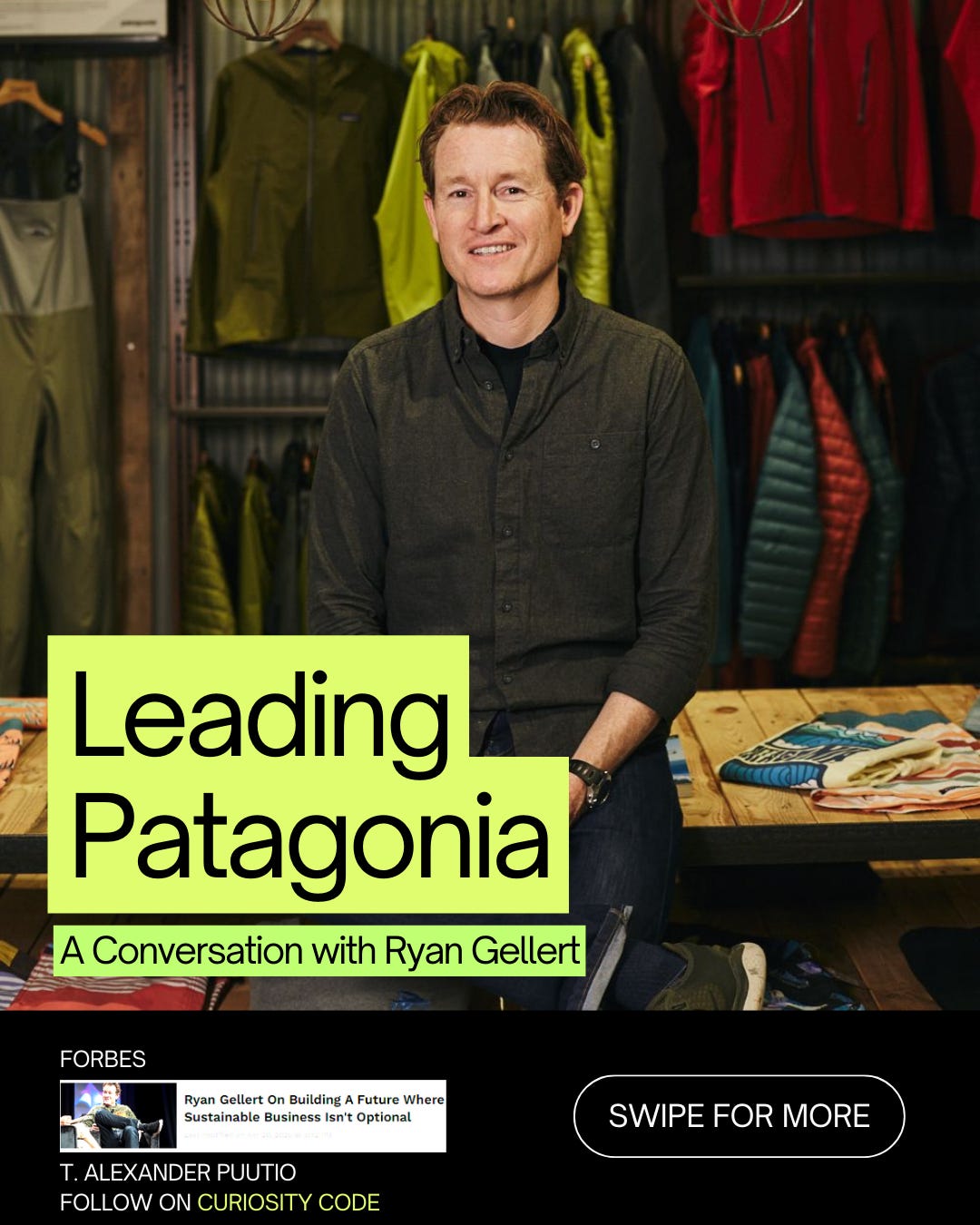An Interview with Ryan Gellert and the Curious Relationship Between Sustainability and Business
An interview with Patagonia's Ryan Gellert and curious thoughts about sustainability and its relationship with business
Here’s a puzzle for you:
What’s a political lightning rod for some, a branding gimmick for others, and a survival strategy for all of us?
If you haven’t been curious about the relationship between sustainability and business, may I suggest it’s not because the topic isn’t important to you, but perhaps because you may not have been paying enough attention to what others feel about it.
Or perhaps you simply picked a side early on and haven’t looked back since.
That’s how I approached it, and many other things, until I began my own long trek toward trying to germinate better thoughts about things that actually matter to me.
Few things are as politically inflamed today as sustainability.
And if you’ve ever caught yourself wondering “what on earth is wrong with those people,” you’re not alone.
First, let's tackle the backlash.
If you haven’t heard of reactance yet, here’s how I explain it to my students, with a little help from our sweet but stubborn boxer, Nelli.
Push her, even when you’re helping her up the stairs, and she’ll stop in her tracks and push right back.
Pull her in for the scratch she just asked for?
She’ll see herself out, thank you very much.
Something very similar happens to all of us when we encounter ideologically motivated reasoning that conflicts with how we’ve made sense of the world ourselves.
What Leon Festinger called cognitive dissonance plays out in countless ways, and one of the easiest tricks our minds pull is to reject a worldview just because it doesn’t match ours. We get upset, we dig our trenches and we push back without a second thought, just like Nelli.
This framework has helped me explain why the ESG movement, pushed with missionary zeal by the liberal sustainability elite (yes, my decade-plus at the UN and lectures at SIPA and Harvard certainly qualify me as one), is facing such vehement rejection today.
We pushed too far, and we did so without listening to those whose voices triggered dissonance in our heads.
Now we wonder why the “shared mission” isn’t being upheld by people we never truly enlisted. Go figure.
But that’s only part of the story
It’s easy to understand the backlash.
It’s harder, and much more important, to understand why, decades after the first calls against greenwashing, so many companies still treat sustainability as just another marketing cost.
It’s not that greenwashing has disappeared. It’s simply become more committed and complex.
The signaling has gotten more expensive, exactly as evolutionary biologists like Amotz Zahavi would predict (here’s a link for those interested in an update on the costly-signaling theory).
The real question, the one we actually need to stay curious about, is this:
Why aren't businesses driving sustainability on their own?
If you solve that, you solve the 2030 Agenda, and whatever comes after it.
The uncomfortable truth
The proximate answer is both simple and, for many, rather unsatisfying:
Sustainable business practices don’t reliably make for better business.
If they did, if integrating sustainability predictably led to higher profits, we could kick our feet up and let entrepreneurs do what they do best: find ways to make money.
(And yes, there’s great research showing sustainability can improve performance in certain cases—like the work at NYU Stern’s Center for Sustainable Business. See here.)
But reality is messier.
The returns to sustainability, whether you call it ESG, CSR, or something else entirely, only seem to emerge for certain kinds of companies, at certain scales.
Customer-facing giants can turn sustainability into a demand driver, and they often do this through marketing. H&M conscious, anyone?
And what about the small or mid-sized players? For most, sustainability efforts often just balloons their costs and erodes their runway. This is why we need advocacy about sustainability and not about margin-based pricing.
It’s a hard truth that many of my colleagues don't seem curious enough about.
Understanding ≠ Accepting
Acknowledging this reality doesn’t mean surrendering to it.
On the contrary, it should make us more committed to fixing the underlying problem.
And no, the problem isn't “awareness.”
It’s not that executives don’t know sustainability matters.
It’s that the cost structure often doesn’t reward it yet.
If we want sustainable business to become the norm, not the niche, we need to:
Make sustainable choices more profitable (oof)
Shift baseline expectations so that sustainable business is simply business (big oof)
The EU is moving in this direction.
So are states like California and New York. But regulation alone has limits.
If you lift standards unilaterally, you often just drive production elsewhere, to places all too happy to race to the bottom. And in the Lord’s year of 2025, we should all be skeptical of any government’s ability to guide profitability and incentive structures in a way that don’t have unexpected consequences down the line (call me and we can talk about the plastic bag ban for starters).
That’s why a race to lower the costs of sustainable technology is just as critical as regulatory frameworks.
From CO₂ capture to circular manufacturing, the only way forward is to make the right thing the easier, cheaper thing too.
Good luck to us all.
A final thought for Earth Day
The night is always darkest before the dawn.
At the end of the 19th century, the biggest urban crisis was horse manure, piling up in the streets of New York and London with seemingly no end in sight.
If you had told city planners in 1890 that in less than twenty years, cars would replace horses almost entirely, they would have laughed you out of the room.
And yet here we are.
I will eternally be a guarded optimist. I want us to solve the hard problems that we should investigate with rigor and vigor, not the easy surface-level questions of why aren’t businesses doing what we want them to.
Decades from now, I hope we’ll look back on Earth Day 2025 and feel a nostalgic kind of pity toward ourselves, how little we knew of the breakthroughs just ahead.
How mixing business and sustainability would go from feeling like mixing oil and water to being more like combining flour and eggs to make a cake.
I'm not alone in my optimism either.
I recently sat down with Patagonia’s Ryan Gellert to discuss what it’s like leading a company under the weight of enormous expectations—and how Patagonia is trying to live sustainability as a business imperative, not a side project.
You can find more from that conversation here.
🧩 This issue’s checklist, by Ryan Gellert
📘 A book to read
Every Purchase Matters by Paul Rice & Smart Brevity by Jim VandeHei
Two books, two kinds of wisdom.
Paul Rice’s Every Purchase Matters shows how every decision we make as consumers and business leaders either moves the world forward—or keeps it stuck. It's a rallying cry for conscious capitalism that doesn't collapse into slogans.
Jim VandeHei’s Smart Brevity flips the script on communication, arguing that clarity, economy, and speed are not optional anymore—they’re survival skills. In a world drowning in noise, how you say it matters as much as what you say.
🧠 Key takeaway: Every choice—whether to buy, sell, speak, or stay silent—is a lever for change. Use it wisely.
✅ A thing to do
Spend time outdoors
This isn’t a lifestyle hack. It’s a survival tactic.
Time in nature recalibrates our brains toward scale, patience, and interconnectedness—the exact qualities sustainability requires.
You can’t build a thriving future if you’re disconnected from the very systems you're trying to protect.
Micro-challenge: No headphones. No phone. Just a walk. Let your curiosity do the wandering. That’s how Albert Einstein got his best ideas, some say.
💭 A thought to have
To gain knowledge, add something daily. To gain wisdom, remove something daily.
More isn’t always better.
In fact, true insight often comes from subtraction—not accumulation.
What can you unlearn, strip away, or simplify today that will leave you smarter than when you started?
Mental model: Treat your mind like a bonsai, not a jungle. Pruning is progress.
🧢 A product to love
Fall ’25 Patagonia Nano Air Ultralight
Engineered for high-output pursuits, built to last, and made with an obsessive eye toward minimizing environmental impact.
It's not just a jacket. It’s Patagonia’s bet that performance and responsibility can—and must—coexist.
Perspective shift: Buy fewer things. Buy better things. And then wear them into the ground.
✍️ Recent writings on Forbes and beyond
✍️ Let’s meet up, I’m talking at
Thomson Reuters’ Momentum AI on how to actually succeed with adopting AI, New York
Glean:GO 2025, SF
AIAI Generative AI Summit, New York
A wonderful set of classes on Persuasion and Leadership at Columbia and Harvard
I am currently conducting a study on range and how it impacts people’s career trajectories. Ten questions and a name will get you on the hall of fame as we pump up the n on the study. Link below - thanks for considering it!
You’ve reached the end - thanks for scrolling all the way down!
Curiosity is best when enjoyed in great company.
Refer this issue and grab a chance to get a case of Half Day ice tea whose founder story you’ll learn more about next month.
A fun duo with a great story and a tasty product to boot. You didn’t ask, but I’ll say it anyway - the raspberry flavor is the way to go.










